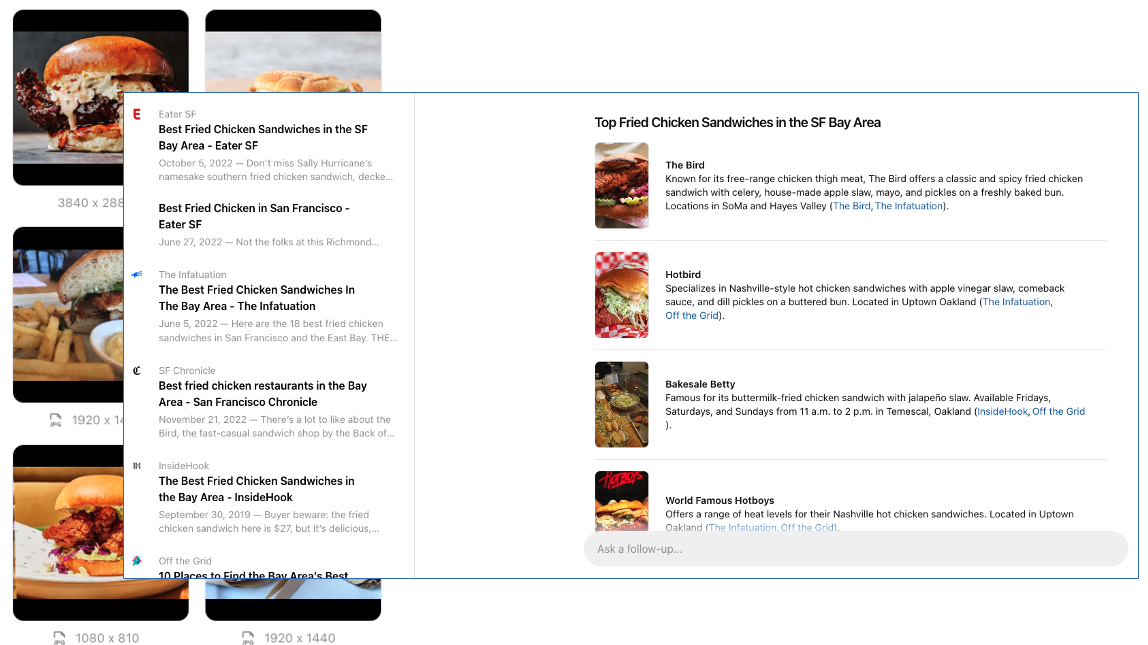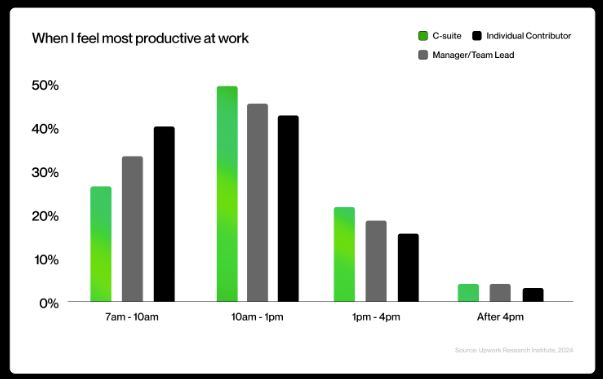SearchGPT, FTC Review Rule, Unproductive AI

SearchGPT's Promising Start
SearchGPT is already a credible challenger for Google – from the jump (as they say). As a paid subscriber I got access this morning, as I'm sure many others did. As you've already seen, there's a two column expandable format. The main column shows primary search results (with thumbnails) and inline links. A left pane can open and toggle between content sources and images. All links go directly to publisher sites. So far I've found very few direct local business links. Instead, local businesses are primarily offered through aggregators or directories. Sometimes local websites are shown. There's a conversational dimension, that Google is aspiring to, which allows you to compare or refine results without initiating a new search. This is a compelling feature and quite different from the current Google UX. The interface is clean and different enough to be enticing to people who are fatigued by too many ads and too much clutter on the SERP. OpenAI has said this is a prototype that will be folded back into ChatGPT ultimately. There are many skeptics of the idea that SearchGPT can gain any market share, given how entrenched and habitual Google usage is. But for most queries it's a viable Google replacement now and for some it's better. Local is an area where it's considerably weaker than Google because of Google's local knowledge/entity graph.

Our take:
- We previously discussed how local is now Google's main differentiator and it arguably has a big advantage over everyone save perhaps Apple.
- Otherwise, I feel like I could substitute SearchGPT today for Google and not really miss it. The UI/UX is less bulky and carries a lighter "cognitive load."
- Business model: Perplexity announced ads. No ads is a great thing about SearchGPT but will the allure of ad revenue be too much eventually?
Fake Review Ban's Limited Impact
Yesterday the FTC announced a final rule "banning fake reviews and testimonials." Mike wrote an analysis of the rule and its potential impact. As a practical matter, the new rule makes it easier for the FTC to go after "knowing violators" and seek civil penalties. As Mike explained, however, it still allows review incentives so long as they don't require a quid pro quo. And there's nothing about the platforms (Google, Yelp, Tripadvisor, etc.) – meaning there are no new obligations, responsibilities or accountability for them. Mike lamented this omission (but see Section 230). However, review management companies will be subject to the rule. Where does all this leave us? It's certainly a good development and may impact review fraud somewhat, by creating some deterrence. But it's unlikely to have a major impact. The way in which consumers rely on reviews for purchase decisions and the ranking rewards mean that merchants large and small will continue to cheat. Offshore review farms (now increasingly AI enabled) will be impossible to prosecute. Local merchants engaged in unethical review practices will fall below the FTC's enforcement radar. Only larger companies and brands will likely be ensnared by the rule, which is something – but not enough.

Our take:
- Google, Amazon and others contend they are diligent about removing fake reviews and suing review fraud purveyors. Their efforts are uneven.
- The FTC simply doesn't have the resources to do more than pick a handful of high profile cases and hope that deters others from cheating. It won't.
- The inability to hold the platforms accountable (per Section 230) represents a major obstacle to comprehensively tackling review fraud. In Europe they may have more luck under the DSA (and w/o a Section 230).
AI Not Boosting Productivity
There's a bit of an AI backlash in process, with several reports now questioning the benefits of AI and the accompanying productivity expectations. Among these, a new study from Upwork (n=2,500 workers and execs.) finds that expected AI gains have largely not – or not yet – materialized. (Enterprises, agencies and SMBs have adopted AI to varying degrees.) The Upwork study found that 71% of employees feel burned out yet subject to higher demands from bosses. Here's the relevant nugget:
"Nearly half (47%) of workers using AI say they have no idea how to achieve the productivity gains their employers expect. Over three in four (77%) say AI tools have decreased their productivity and added to their workload in at least one way. For example, survey respondents reported that they’re spending more time reviewing or moderating AI-generated content (39%), invest more time learning to use these tools (23%), and are now being asked to do more work (21%). Forty percent of employees feel their company is asking too much of them when it comes to AI.
Conversely, the report found that 81% of executives at companies that had deployed AI believed it had increased productivity. The report recommends: 1) using more freelancers, 2) creating new/better productivity metrics, 3) providing more/better AI training.

Our take:
- There's no question that with the right use cases AI can deliver significant productivity gains. I suspect a lack of training is a significant issue.
- Turning employees into simply editors of AI content can and probably will exacerbate burnout, the real problem identified in this research.
- It's premature to pass judgement on AI but, as the report suggests, AI is a tool that should be judiciously deployed and not a panacea for productivity woes.
Recent Analysis
- FTC Announces Rule Banning Fake Reviews, by Mike Blumenthal.
- Google’s engagement-hacking masks stalled growth, by David Mihm.
- Near Memo 169: GBP bugs & AI-driven layoff concern, sale of CNET & Google, antitrust remedy: impact on Apple & SEO.
Short Takes
- Google launches AI Overviews globally.
- Google takes aim at SEO with new core update, now rolling out.
- Google won't reinstate reviews after profile reinstatement.
- Easiest way to claim a service area business listing on Google.
- OpenStreetMap, Wikipedia for maps, still going after 20 years.
- Report: Apple developing smart home device: iPad + robotic arm.
- DOJ's Kanter talks about forward-looking Google antitrust remedies.
- Understanding search ranking (post-leaks) with SEO action items.
- Stratechery: Hands off Android Justice Department!
- Google betting big on AI and "Gemini Assistant" in new Pixel 9 devices.
- TikTok beat Instagram Reels in single client head-to-head campaign.
Listen to our latest podcast.

How can we make this better? Email us with suggestions and recommendations.

